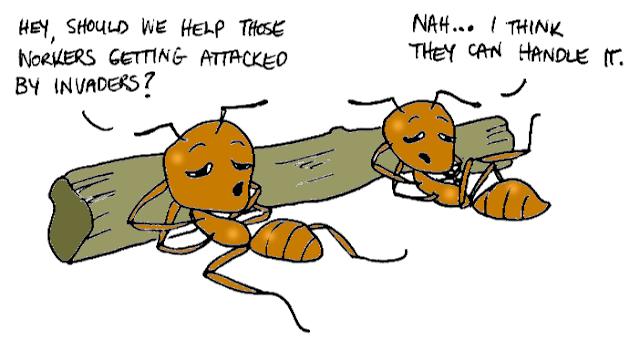Ants have always been the epitome of industriousness and team work. Since childhood, we have been fed with stories where ants put in the hard work and are well rewarded in the end for their effort. Time and again, ants save the day because they are hard working. Ask the lazy grasshopper, if you do not believe me. But, that’s not completely true. In a recent study published in Science Magazine, researchers at the Georgia Institute of Technology, studied burrowing techniques of ants and found that 30% of the ants actually do the work. This might just be the reason, you have been looking for, to justify your lazy attitude but before you harp on it, do read this post to know why ants do so.
The same logic can be applied to transportation issues in a city as well. Any given route has a maximum carriage capacity and traffic woes arise because, we force extra carriage through it, especially during peak hours. What we really need to do is to streamline our efforts into ensuring that more people can be accommodated in lesser vehicles during peak times. What we do instead is bring out our own private vehicles on the road, to reduce commuting times and end up further complicating that issue. This simple solution to this, is to get a little lazy and let the 30% do the work to ensure that the system works efficiently.
would mean local transportation authorities identifying carrying
capacities of its infrastructure, planning public transport in a way to
ensure that it is adequately utilized and avoiding traffic clogs to
allow people to move freely, even during peak hours. Well, if this
laziness could help you beat your traffic blues, everyday, wouldn’t you
rather be lazy?
In case, you are still hung on to the title of the post and are looking for laziness in ants, there is some good news for you after all. A study conducted at the University of Arizona showed that a significant number of ants in a colony are indeed lazy and are not working in the nest. There are many theories that have been put out by the researchers to explain why ants do so.
Theory 1 : Flexibility
Foraging work done by ants is quite variable in nature. On a regular day, you might get access to a little food and on a lucky day, there might be excess food that can be foraged. The colony cannot scale up instantly to make forage food that very day and, therefore, must build up its population to ensure that there are enough hands, if needed on an eventful day. This practice, is quite common in Information Technology (IT) companies that usually have ‘bench’ of staff that can be assigned to new projects immediately, rather than initiating the process of hiring.
Theory 2 : Threshold
This theory tries to explain the laziness of some ants, by citing that each ant has a different threshold when it comes to work, just like humans do. Different people have different thresholds, when it comes to preparing for an exam. For some, it is a month, for some a fortnight, while some only begin the night before. The lazy ants are probably, the third kinds that work only when the pressure of work is extremely high.
Theory 3 : Scale
Laziness may also creep into a colony, once it has grown to a significant size. Just like employees in a massive multi national organization function, where exists a clear chain of command, and people move and respond slowly to instructions, as they filter up or down, through ‘established’ channels, probably the ants that are seen lazing around in colonies, are just yet to get their instruction from their higher ups.
In case, you would like to know more about this study, there is a well written post from Sketchy Science (it has cartoons too)



1 comment
Awesome information thnx for it